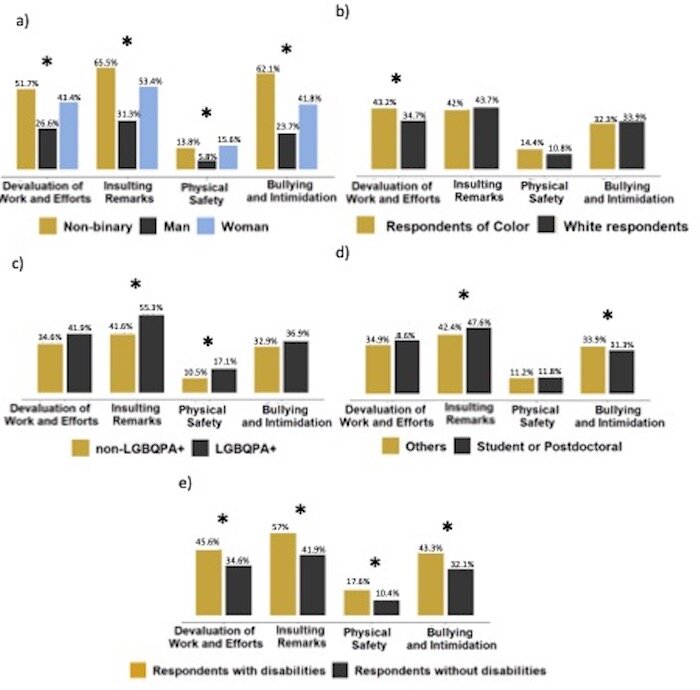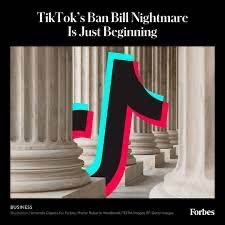Occurrence of interpersonal mistreatment or incivility in the workplace over the prior 12 months presented by (a) gender, (b) race and ethnicity, (c) sexual orientation, (d) career stage, and (e) ability status. Stars represent significant differences between demographic groups for specific behaviors. Credit: Earth’s Future (2023). DOI: 10.1029/2022EF002912
A first-of-its-kind workplace climate survey of Earth and space scientists indicates that scientists of color, women, those with disabilities and other groups historically excluded from geoscience careers are more likely to experience hostile and discriminatory behavior at work than their colleagues. The results have implications for retention of scientists in these fields that go beyond current efforts to improve diversity through recruitment activities.
The survey, distributed through five professional organizations, asked respondents to focus on their workplace climate in the past year and to rate how often they experienced a range of positive as well as exclusionary behaviors, including general incivility or interpersonal mistreatment, negative or discriminatory language, and sexual harassment.
Results published in the journal Earth’s Future and reported last week in Nature Geoscience analyzed differences in responses by gender, race and ethnicity, sexual orientation (lesbian, gay, bisexual, queer, pansexual and asexual—LGBQPA+), career stage, respondents with or without a disability, and transgender identity.
Although a large majority of respondents reported positive interactions in the workplace—colleagues showing genuine concern, respect and public recognition of accomplishments, among others—negative interactions were common, especially among groups historically excluded from geoscience careers. They experienced higher rates of conduct characterized as incivility in the workplace: devaluation of work, insulting remarks, threats to physical safety, bullying and intimidation.
Specifically, geoscientists of color reported higher rates of discriminatory remarks about race and were more likely than white respondents to have their work devalued, as were students and early career scientists compared to scientists at other stages in their careers.
“The results validate our argument that you can’t just throw all your resources toward recruitment, which is where the majority of previous diversity, equity and inclusion initiatives have focused,” said Blair Schneider, Kansas Geological Survey science outreach manager and associate researcher.
Schneider is co-principal investigator on the ADVANCEGeo Partnership, which conducted the research. The ADVANCEGeo Partnership includes scientists from the KGS and seven other institutions for research focused on reducing hostile workplace climate barriers in the geosciences.
“Instead, you have to consider recruitment and retention,” Schneider said. “If you manage to recruit more folks into the space, how will you ensure that they feel included and want to stay?”
While recruitment is a vital tool for increasing diversity in the geoscience field, creating a safe, welcoming and respectful climate is equally crucial for retaining scientists, said researcher Emily Diaz Vallejo, a graduate student at the University of Wisconsin-Madison.
“Unfortunately, our findings reveal that many underrepresented groups often face negative experiences throughout their careers, which can significantly impact their productivity and desire to remain within their organization or the geoscience field as a whole,” Diaz Vallejo said.
Underrepresented groups reported in larger numbers that their experiences in the workplace had resulted in negative professional consequences, including avoiding others at work, loss of confidence, lowered productivity, skipping professional activities or considering career changes. Negative individual professional consequences have negative consequences for geosciences as a whole, Schneider said.
“Diversity and representation in the geosciences means greater inputs of creativity, problem-solving and unique perspectives to solve some of today’s greatest challenges,” she said.
“Take climate change, as an example. Climate change is causing more extreme climatic events, which impacts our society disproportionately based on race, gender identity, socio-economic status, age, ability and more. If we lack diversity and representation in the geoscience workforce, then we lack the information needed to support all members of our society as we look to mitigate the effects of these climatic events.”
While the data provide a snapshot of a year’s time span, missing are long-term impacts of these exclusionary behaviors over people’s careers, said Erika Marín-Spiotta of the University of Wisconsin-Madison and ADVANCEGeo Partnership principal investigator.
“We may not have that data, but we have people’s stories,” Marín-Spiotta said. “We all know people who left their jobs or science because they were harassed, bullied or discriminated against. Our data hopefully can put to rest the ‘it doesn’t happen in our discipline’ comments.”
The researchers found that more than half of women, nonbinary and LGBQPA+ scientists experienced identity-based discriminatory remarks. Nonbinary respondents were twice as likely as women and more than three times as likely as men to hear negative remarks about physical or mental health.
“One of the most important results of this paper was data revealing that historically excluded groups experience higher rates of sexual harassment than that of all respondents, particularly for nonbinary, disabled and LGBQPA+, which was two to three times higher than the overall response rate,” Schneider said.
The survey also asked respondents about the consumption of alcohol in professional settings. A majority indicated they were comfortable with or indifferent about the amount of alcohol consumed in professional settings. However, historically excluded and vulnerable groups, such as early-career, respondents were more likely to feel discomfort.
“As we show, alcohol plays such an important role in our discipline,” Marín-Spiotta said. “It is prevalent at conferences, during fieldwork and departmental events, but not everybody feels welcome or comfortable in environments where alcohol flows freely, so it’s an issue of inclusiveness and safety. No surprise, we found that those groups that experience more harassment, bullying and exclusionary behaviors also feel the least comfortable with the levels of alcohol in professional settings.”
The study’s authors continue to analyze data from the survey and expand their research to other STEM fields. A second study of nearly 400 ecologists, using the same workplace climate survey and published in Frontiers in Ecology and the Environment, found similar results in that field.
“Our survey was designed to be able to view our data through multiple, intersecting lenses to understand who in the community is most at risk,” Schneider said. “With this data, we can now design our interventions to better support the groups who are disproportionately impacted.”
More information: Erika Marin‐Spiotta et al, Exclusionary Behaviors Reinforce Historical Biases and Contribute to Loss of Talent in the Earth Sciences, Earth’s Future (2023). DOI: 10.1029/2022EF002912
Provided by University of Kansas
Citation: Survey: Geoscientists from historically excluded groups more likely to experience discriminatory behavior at work (2023, March 15) retrieved 20 March 2023 from https://phys.org/news/2023-03-survey-geoscientists-historically-excluded-groups.html
This document is subject to copyright. Apart from any fair dealing for the purpose of private study or research, no part may be reproduced without the written permission. The content is provided for information purposes only.
































